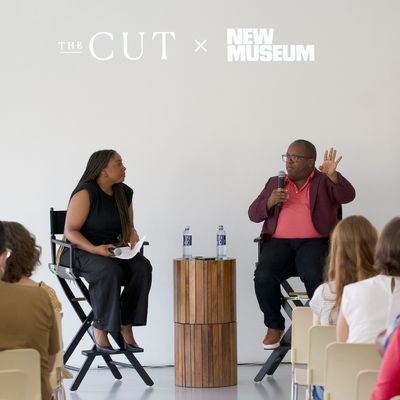
The Cut has partnered with the New Museum on a speaker series (open exclusively to New York Magazine subscribers) about the intersection of self, society, and contemporary art and drawing inspiration from the museum’s exhibitions. This week, the Cut’s editor-in-chief, Lindsay Peoples, spoke with award-winning playwright, composer, and lyricist Michael R. Jackson (whose A Strange Loop won the Tony Award for Best Musical last month) about representation. They discussed everything from the influence Tyler Perry and Liz Phair have had on Jackson’s work to the ways representation plays out in art-historical contexts and how his mom feels about his show.
Their conversation reflected what’s currently on view at the museum — including a career-spanning exhibition of Robert Colescott’s bold, satirical portraits that reimagine iconic artworks with Black people. “Off-Grid,” an exhibition of Paris-based artist Kapwani Kiwanga’s larger-than-life installations, parallels the layered nature of A Strange Loop. Kiwanga’s works are at once subtle and imposing in scale, and, like in Jackson’s narrative, there’s much more to them than first meets the eye. Kiwanga’s commentary on colonial histories and police violence reveals itself as you learn about the material, and Jackson’s musical is a play within a play and a story about a story, in which his own life plays a not always visible but vital role: “Writing about it was a way of living it, and living it was a way of writing it,” Jackson said. “It was such a reciprocal process, and I think I just had to chase after it, because I wanted to be free.”
In the museum’s airy Sky Room, surrounded by panoramic views of the city, the crowd took in every word of the lively, thoughtful, and very funny conversation. It was clear that Peoples and Jackson — both incredibly accomplished, honest, down to earth, and still close to the communities they came from — understood each other, and both had a lot to say about the complex task of representation.
Michael R. Jackson on A Strange Loop being considered a Trump-era play:
There was a writer from the Times who sort of just lumped A Strange Loop in with this article about artists responding to Trump or something like that. And the thing I had to sort of clap back at a little bit online about that was like, listen, I started writing this when George W. Bush first went into office, and I kept working on it the second Bush term and both the first and second Obama terms. I had my first reading at Playwrights Horizons four days after Trump was elected. So everything about the piece, which again, was drawn from my personal experience but was also a kind of fictionalized account of it, was me taking whole time periods and weaving it together through this character. The character of Usher — he’s 25 going on 26. But when I started writing it, I was 23. And when I was 23, I still, in a lot of ways, was kind of 17. And now I’m 41. And I was 38 when the show was Off Broadway, so in terms of responding to the political climate or the present climate, it’s all a little bit relative, because it’s kind of every climate was what I was responding to.
On being an outsider:
I had so many dark nights of the soul living in the city. I came of age in the mid- to late ’90s in Detroit, Michigan, and I actually came up around a lot of Black gay boys, and even within my Black-gay-boy social circle in high school, I still was an outsider. When you’re an outsider, you start to develop a point of view and you start to develop a sense of humor. I was told, “Oh, once you move to New York, you’re gonna have this great gay time and everyone’s gonna fuck you and it’s gonna be amazing.” Then I got here and everyone was like, “Get out of my way, you ugly fat boy. I don’t want to have anything to do with you.” So again, outsider. And it was very painful, but I had to find the humor in it or else I would not want to live. I’m ultimately at heart a pretty hopeful person, and I think that ended up serving me in my life and in my work.
On referencing Tyler Perry in A Strange Loop:
I’m not some snooty elite descending from a tower. I actually take his work very, very seriously. And the thing that inspired the song “Tyler Perry Writes Real Life” is that I heard two separate Black folks in my life tell me that the reason why they liked his work was because it was like real life. One of them was my mother. And I was just like, wait, wait, wait. His work is many things, but it’s not real. It would be one thing if we could just laugh and enjoy or whatever. But now y’all are trying to say this is real? What’s crazy is that when I watched it, I did recognize what he’s trying to do. His stage plays, specifically, but also the movies and TV shows — they reminded me of growing up and seeing the Black-history program in church or the Christmas program or the Easter program. But other than that, it wasn’t real, especially with all the moralizing and the religious lessons that you’re supposed to take from it. And I just became obsessed with the idea that there were people who felt that this was real. I wanted to show the nuances of that — what it’s like to see this overblown, moralistic display of Black life in comparison to something that, in my mind, was more nuanced. Over the years of working on it, I had to show the nuance of this: What is actual, real Black life? What is it? What does it feel like? And take that very, very, very seriously even as I’m making fun of it and being comedic.


